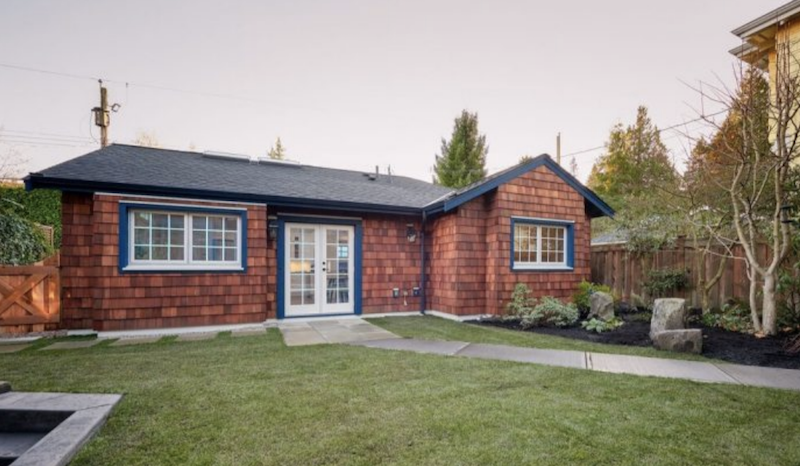News & Awards.
including honors for “Best Mixed Use,”
“Best Office,” and “Best Historic Rehabilitation”.

Spread the Word: California Already Created the Tools for Us to Tackle the Housing Crisis Right at Home. Let’s Start Using Them.
In following with the sentiments outlined in “Solving Our Housing Crisis One Garage at a Time” (April 9, 2020) by John McNellis, I, too, look around my neighborhood and imagine the potential of existing underused spaces and garages to house people. What I’d like to clarify is that Mr. McNellis’ call for by-right Accessory Dwelling Units (ADU) has already been answered. These conversions are now legal throughout California thanks to landmark by-right ADU laws signed by the Governor in 2017 and 2020 that address our housing crisis.
Today, ADUs are also proving a powerful solution to housing during the COVID pandemic. It is heartening to know that there was strong and widespread legislative support for these groundbreaking laws that deliver clear bene ts to needy households in California. ADUs — also known as “grannie ats” or “second units” — are cheaper to build, attractive to renters who want to stay in their neighborhood, and now are easier than ever to create.
For a full description of these California laws, go to the State Department of Housing and Community Development ADU website https://www.hcd.ca.gov/policy- research/AccessoryDwellingUnits.shtml.
These laws give Californians the legal tools to help ease the housing crisis — and more imminently the health crisis — right at home. In 2017, California legalized the conversion of existing buildings on single-family lots to ADUs – for example, garages and basements.
As of January 1, 2020, this law expanded to allow every single-family homeowner to add both an ADU and a junior ADU, including a new structure in the yard. Specs can include a new 800-square-foot free-standing 16-foot-tall structure within 4 feet of back- and side-yard lines, regardless of lot coverage or other zoning requirements.
This makes possible a not-too-distant future where families will be able to order a “plug and play” ADU to be set up in their yard for about the price and ease of ordering a car online. This opportunity could thus revolutionize the home design, building, and delivery industry, creating more inclusive neighborhoods where families in a variety of jobs — including essential service providers priced out today — can once again live.
The 2020 law also allows for ADUs in rear yards and unused areas of apartment buildings (attics, storage areas, garages) following a model established by San Francisco. Apartment owners statewide are just beginning to explore how these laws will allow them to add a unit to existing properties without disrupting current tenants. Over time, multifamily property ADUs will become a significant portion of new ADU development. Thus, today every California residential property owner can create these homes by right with just a building permit.
Additionally, the 2017 laws produced huge changes that are just now starting to be felt. In Southern California alone over 20,000 new ADUs have been built in just a few years. According to U.C. Berkeley’s Terner Center, the number of accessory homes in California increased by over 500 percent as a result of the 2017 law alone. The new 2020 changes make California the national leader in state-led by right ADU policies and will unleash another wave of ADU home deliveries.
Cities around the globe that removed ADU barriers saw 20-30 percent of their homes add an ADU within a decade (Vancouver, Portland, Seattle, New South Wales Australia). If just 30 percent of the nearly 7 million single-family homes in California added an ADU, with more in multifamily properties, California could shelter over 2.1 million more households. That is nearly 1/3 of the aspirational “3.4 million new homes” that the McKinsey Global Institute identified as the housing need for California. ADUs are not the only or even the most important housing solution, but they are a tool that small property owners can use right now to make a difference today.
The California ADU by right laws are so recent that many Californians are unaware of them. That is why The Casita Coalition was formed in late 2019 as a statewide network to support homeowners, cities and professionals to expand ADUs and small-housing options. Many of our founders and members were instrumental in bringing about recent law changes. As the recent recipients of a $400,000 start-up grant from the Chan Zuckerberg Institute, The Casita Coalition will be ramping up its efforts to communicate the big bene ts of small housing.
Many small ADUs now also have been deployed as emergency shelter-in-place housing and have allowed families to bring seniors home to be cared for outside of group settings during the COVID pandemic. Just in my group of family friends, recently created ADUs are deployed as “quarantine” shelters for urgent care medical professionals and those returning from COVID hotspots. Even students sent back with less than a week’s notice from colleges in COVID centers like Boston and New Orleans are quarantined safely in a recently created backyard ADU as provided by a friend or family member.
If you have the opportunity to take a social distancing walk around your community, whether in Atherton, Castro Valley, Menlo Park, Novato, Oakland or San Jose, look at the possibilities: homes on lots with land and garages, families who can “self-help” solve California’s housing crisis and renew their communities. What a powerful thing it will be, when the shelter-in-place orders are lifted, and millions of California families begin to house extended family, elders and community members facing economic catastrophe as a result of the COVID-19 pandemic right now right at home. You too can help by informing your family and friends.
For now, stay safe, stay home and spread the word: Californians can, by right, create affordable housing in our very own backyards.
Find out about the new ADU laws or learn more about The Casita Coalition online at www.casitacoalition.org.


